Harnessing AI for Magicians: Innovating in Advertising, Media, Music, Effects, and Beyond

Photo by <a href="https://unsplash.com/@alecfavale" rel="nofollow">Alec Favale</a> on <a href="https://unsplash.com/?utm_source=hostinger&utm_medium=referral" rel="nofollow">Unsplash</a>
Introduction to AI in Magic
Magic, as an art form, has continually evolved, entwining elements of illusion, psychology, and technology to captivate audiences across generations. From ancient conjurers relying on sleight of hand, to 19th-century magicians incorporating mechanical devices, the history of magic is rife with innovation. Modern magic began to see a significant transformation with the advent of digital technologies in the late 20th century, integrating computer-generated imagery and sophisticated lighting effects to enhance performances. These technological progressions have not only elevated the spectacle of magic but also expanded the repertoire available to magicians.
Today, Artificial Intelligence (AI) stands at the forefront of potential technological advancements in magic. AI’s data processing capabilities and pattern-recognition strengths present a myriad of possibilities for creating unprecedented magical acts. For instance, AI algorithms can analyze and predict audience responses, allowing magicians to tailor their performances in real time for optimal engagement. Furthermore, AI’s integration into media and special effects can help magicians create more immersive and interactive experiences.
The application of AI within magic is not merely aspirational but is already seeing practical use. Magicians are beginning to explore AI-driven holography and augmented reality (AR) to construct illusions that were previously inconceivable. Machine learning, a subset of AI, can also assist in designing complex tricks that leverage computational creativity, pushing the boundaries of what is possible within live performances.
As we delve further into this blog post, we will explore specific areas where AI is making significant impacts in magic. From revolutionizing advertising strategies, transforming media consumption, enhancing musical accompaniments, and advancing magical effects, AI’s potential to innovate within the magical arts is boundless. This journey will unravel how the synergy between tradition and cutting-edge technology is redefining the landscape of magic, heralding a new era of wonder and amazement.
AI-Powered Advertising for Magicians
In today’s fast-evolving digital landscape, AI tools have emerged as game-changers for advertising, particularly for professionals in niche fields such as magic. Leveraging AI-driven marketing strategies, magicians can significantly enhance their advertising campaigns, ensuring they reach the right audience, at the right time, with the right message.
One of the core advantages of integrating AI in advertising is the ability to harness targeted advertising effectively. AI algorithms can analyze vast amounts of data from various sources, identifying potential audiences that are most likely to be interested in a magician’s performance. This targeted advertising ensures that promotional efforts are not wasted on uninterested viewers, thereby optimizing budget and efficiency.
Audience analytics is another crucial area where AI excels. By utilizing machine learning and predictive analytics, magicians can gain deep insights into their audience’s preferences and behaviors. Such data-driven insights enable magicians to tailor their marketing strategies to meet the specific needs and desires of their audience segments. For instance, AI can predict the best times to post on social media for maximum engagement or suggest content themes that resonate most with followers.
Personalized content creation, facilitated by AI, is a significant advantage that magicians can leverage. By analyzing user data, AI tools can generate personalized advertisements, promotional videos, and even email marketing campaigns that speak directly to individual preferences and interests. This level of personalization not only increases engagement but also fosters a deeper connection between the magician and their audience.
Successful campaigns have already demonstrated the power of AI in increasing a magician’s visibility. For example, a magician used AI-powered tools to create a series of personalized video advertisements that were distributed through social media. The campaign resulted in a 30% increase in engagement rates and a significant boost in ticket sales for upcoming shows. Another magician utilized AI for audience segmentation and tailored email marketing, achieving open rates and click-through rates that were substantially higher than previous generic campaigns.
Integrating AI in advertising is not just a trend but a necessity for magicians aiming to stand out in a crowded market. By effectively utilizing AI-driven marketing strategies, targeted advertising, thorough audience analytics, and personalized content creation, magicians can not only enhance their visibility but also build a loyal and engaged audience base, ensuring sustained growth and success.
Transforming Media Presence with AI
In the dynamic world of entertainment, artificial intelligence (AI) has emerged as a transformative tool for magicians seeking to enhance their media presence. With the power to create, distribute, and optimize content across various platforms, AI offers innovative solutions that can revolutionize how magicians interact with their audience and sustain their visibility in a competitive market.
One significant application of AI in this field is social media management. Advanced algorithms can analyze audience behavior, preferences, and engagement patterns to curate personalized content and suggest optimal posting times. Tools such as Hootsuite and Buffer leverage AI to automate content scheduling and provide actionable insights, enabling magicians to maintain a consistent and engaging online presence without the associated time constraints.
In addition to social media, AI plays a crucial role in video editing. Tools like Adobe Premiere Pro and Magisto utilize AI-driven features to streamline the editing process. By automatically trimming and stitching footage, adding effects, and suggesting enhancements, AI empowers magicians to produce professional-quality videos that captivate their audience. These tools reduce the technical burden, allowing magicians to focus on their craft rather than the intricacies of post-production.
Content recommendation systems also benefit from AI technologies. Platforms like YouTube and Spotify use machine learning algorithms to personalize recommendations based on user behavior and preferences. For magicians, this means their content can reach a broader audience through tailored suggestions, increasing their visibility and engagement. By leveraging these platforms, magicians can ensure their unique performances and tutorials reach those most likely to appreciate and share their work.
Audience interaction is another critical area where AI excels. Chatbots and virtual assistants, such as those powered by IBM’s Watson or Google’s Dialogflow, facilitate real-time interaction with fans. These AI tools can answer queries, provide performance updates, and even offer personalized recommendations, fostering a more interactive and engaging relationship between magicians and their audience.
By embracing these AI-driven tools and platforms, magicians can significantly enhance their media presence. AI not only streamlines content creation and distribution but also provides invaluable insights and personalized engagement, ultimately enabling magicians to connect more deeply with their audiences and continue to innovate within their craft.
Revolutionizing Music and Sound Effects
In recent years, artificial intelligence has made significant strides in transforming various sectors, including the music and entertainment industries. For magicians, AI technology is revolutionizing music and sound effects, offering unparalleled opportunities to enhance their performances and captivate audiences. One of the most groundbreaking advancements is AI-powered music composition, which allows magicians to create unique and customized musical scores tailored to their acts. By leveraging machine learning algorithms, these tools can compose music that perfectly fits the mood and rhythm of a performance, ensuring a seamless auditory experience.
Real-time sound alteration is another innovative aspect of AI that magicians are increasingly utilizing. Through AI algorithms, sound effects can be modified in real-time to match the actions and movements of the performers. This dynamic sound adaptation can significantly elevate the ambiance of a magic show, providing audiences with an immersive experience that feels spontaneous and organic. For instance, AI can instantly alter background music to build suspense or introduce whimsical tones to complement a surprise reveal.
Custom sound effects generation is yet another domain where AI is proving invaluable for magicians. Traditional sound effect libraries can be limiting and may not provide the exact auditory nuance required for a specific trick or illusion. AI-driven sound design tools enable magicians to create bespoke sound effects that are uniquely suited to their performances. These tools can generate a wide range of sounds, from mystical chimes to dramatic crescendos, allowing for a rich and varied soundscape that enhances the overall magical experience.
Several AI tools and platforms have emerged to assist magicians in integrating advanced sound technologies into their acts. For example, Amper Music utilizes AI to compose original music within minutes, while tools like Adobe Audition employ AI for real-time sound editing and enhancement. These technologies empower magicians to have greater control over their auditory environment, paving the way for more dynamic and engaging performances.
Creating Visual Effects with AI
The advent of artificial intelligence in the realm of visual effects (VFX) has undeniably revolutionized the landscape for magicians. By integrating AI-driven VFX software, magicians can now produce stunning visual effects that were once considered the domain of high-budget Hollywood studios. These advancements enable real-time graphics generation and augmented reality (AR) enhancements, transforming traditional magical acts into awe-inspiring spectacles.
AI-driven VFX software has significantly lowered the barrier to entry, allowing even those with limited technical expertise to create and manipulate high-quality visual effects. Tools like Adobe After Effects and Houdini, now enhanced with AI capabilities, facilitate intricate effect creation with ease. Machine learning algorithms analyze and process complex patterns, allowing magicians to design effects that seamlessly blend with their performances, offering an elevated experience for their audience.
Real-time graphics generation stands as a cornerstone of AI integration in magical performances. Technologies such as Unreal Engine and Unity harness AI to deliver visual effects that react instantaneously to a magician’s movements and cues. This synchronization between the performer and the digital effects creates a cohesive and immersive experience, captivating audiences and making each act appear almost otherworldly.
Augmented reality (AR) further expands the capabilities of magicians, providing additional layers of mystique. AR employs AI to overlay digital effects onto the real world, thus blurring the line between reality and illusion. For instance, a magician could summon ethereal creatures or fantastical landscapes that interact with both the performer and the spectators, all achieved through AR’s transformative potential.
Several prominent magicians have already embraced AI visual effects, showcasing its transformative impact on their art. For example, renowned magician Marco Tempest has seamlessly integrated AR and AI into his acts, producing performances that combine storytelling with interactive visuals. Similarly, digital magician Zach King utilizes AI to craft viral video illusions that captivate global audiences on platforms like TikTok and Instagram.
Enhancing Audience Interaction and Engagement
Artificial Intelligence (AI) is significantly revolutionizing the way magicians engage and interact with their audiences. One of the core advancements lies in AI-driven crowd analytics. By utilizing sophisticated algorithms, AI can analyze audience reactions and behaviors in real-time, providing magicians with valuable insights. These insights enable performers to tailor their acts dynamically, ensuring a more responsive and engaging show that resonates with individual audience members.
Moreover, personalized audience engagement tools powered by AI are allowing magicians to create bespoke experiences that capture the imagination of each spectator. For instance, machine learning models can analyze demographic data, social media interactions, and previous performance feedback to predict preferences and interests. This analysis enables magicians to design customized tricks and illusions that precisely match the anticipations and emotional triggers of their audience, thereby increasing the overall impact of their performance.
Interactive performance enhancements through AI are also transforming magical acts. Tools such as augmented reality (AR) and virtual reality (VR) are being integrated into live demonstrations, blurring the lines between the physical and digital realms. AI can synchronize these technologies with the magician’s routine in real-time, creating illusions that are not only visually spectacular but also highly engaging. For example, an AI-powered AR app can make objects appear out of thin air or change their form right before the audience’s eyes, providing an entirely new dimension to traditional magic tricks.
The combination of these AI technologies is resulting in more immersive and personalized magical experiences. By leveraging crowd analytics, personalized engagement tools, and interactive enhancements, magicians can forge a deeper connection with their audience, ensuring every performance is memorable. Such innovations highlight the transformative potential of AI in redefining audience interaction and setting new standards for entertainment in the world of magic.
Future of AI in Magic: Predictions and Trends
The role of artificial intelligence (AI) in magic is set to expand dramatically in the coming years. As emerging technologies continue to evolve, the application of AI in the realm of magic will likely transcend current expectations, blending human creativity with machine efficiency in unprecedented ways.
One of the foremost trends predicted by industry experts is the integration of AI in real-time audience interaction. Advanced algorithms capable of instantaneously interpreting audience reactions could dynamically alter performances as they unfold, creating a new level of engagement and personalization. This form of instant feedback loop can help magicians craft performances that are uniquely tailored to each audience, thus enhancing the overall magical experience.
Furthermore, AI-powered predictive analytics could provide magicians with deeper insights into audience preferences, allowing for the design of more compelling acts based on data-driven decisions. By leveraging machine learning to analyze patterns in audience behavior, magicians can optimize their performances for maximum impact.
However, the incorporation of AI in magic is not without its ethical considerations. The use of automated systems in performances raises questions about the authenticity and originality of magic acts. There is a delicate balance to be struck between leveraging AI to enhance magic and ensuring that the human element remains at the forefront. Magicians must remain vigilant against over-reliance on technology, ensuring that the essence of human creativity is not lost in the process.
Insights from futurists suggest that the trajectory of AI in magic will also involve a synergy between augmented reality (AR) and AI. This fusion could create new forms of magic that blur the lines between the virtual and physical worlds, offering audiences experiences that are both novel and enchanting.
Ultimately, while AI stands poised to revolutionize the field of magic, the true magic will lie in how magicians harness these technologies to complement their creative flair and ingenuity. The future promises a symbiotic relationship where AI and human creativity coalesce, creating magical experiences that are richer, more interactive, and profoundly immersive.
Conclusion: Merging Magic with Technology
As we have explored throughout this blog post, the integration of AI into the realm of magic offers a dynamic and unprecedented opportunity to revolutionize the art form. From advertising and media to music and special effects, artificial intelligence is enabling magicians to innovate and captivate their audiences in novel ways. AI-driven advertising can provide highly targeted campaigns tailored to potential audiences, creating a stronger connection between performer and spectator before even stepping on stage.
In the realm of media, AI tools can assist magicians in enhancing their visual storytelling, adding layers of intrigue and immersion through cutting-edge visual effects. The music industry insights driven by AI can also help magicians in song selection and composing unique soundtracks that elevate the overall magical experience. Additionally, AI’s role in special effects cannot be understated, as it allows for the creation of illusions that were previously deemed impossible.
Adapting to these technological advancements is crucial for magicians who seek to remain relevant and enthralling in today’s fast-evolving entertainment landscape. By embracing AI, magicians can push the boundaries of conventional performances, leading to new forms of artistic expression and audience engagement. The fusion of magic with technology can lead to groundbreaking acts that hold the potential to dazzle and astonish audiences in ways never before imagined.
In conclusion, the synergy between magic and artificial intelligence represents a new frontier in the world of entertainment. Magicians are encouraged to view AI not as a replacement, but as a powerful tool for innovation and creativity. By harnessing the capabilities of AI, magicians can ensure their craft continues to evolve, captivating and inspiring audiences for generations to come.




